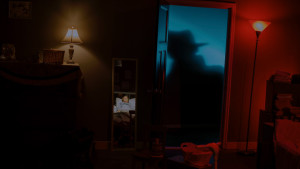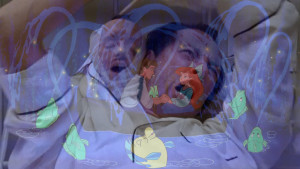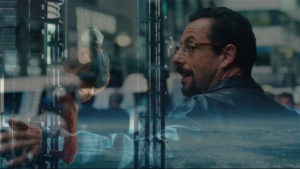
As a novice to European travel, I was surprised by how much European people are concerned with or have strong opinions on architecture. No shortage of (mostly non-French) Europeans felt it necessary to tell me how ugly they find the city of Cannes.
The bones of a beautiful Mediterranean city are gutted by modernistic luxury storefronts, ever-garish hotels, and restaurants desperate to be loud enough to break through the noise and grab the attention of tourists. And while my rookie travel sense could not help but still be amazed at the beauty and bustle of Cannes, I did begin to look around and think, “Who could possibly live here?” Some minor inquiries about the state of post-festival Cannes tourism led to the information that it was mostly a city propped up by corporate/industry events, or a hub city for those tourists looking to bask in the beauty of the French Riviera but who cannot afford more than an afternoon’s stay in the lavish Monaco or San Tropez. You can see what these naysayers are thinking: for all the money and luxury, it’s hard to pull out an individual identity from Cannes that doesn’t just exist in faded comparison to other famous cities. This brings us to The Stars at Noon.
Claire Denis, one of international cinema’s most beguiling and absorbing hypnotists, finds herself going fairly straight in her new A24-produced English-language feature, The Stars at Noon. Armed with permanently up-and-coming Hollywood leads Margaret Qualley and Joe Alwyn, Denis has delivered an adequately vibe-rich thriller in the tradition of Michael Mann’s perpetually-reclaimed Miami Vice and Steven Soderbergh’s Haywire. That should sound appetizing to most, as it’s keeping very fine company. But I did end up feeling the loss of a filmmaker who could make something as brilliantly illusive as L’intrus, or as devastatingly reflective as Let the Sunshine In. This is especially true given elements like Qualley’s performance, which exists in such chaotic motion that it makes most of Denis’ previous internally-tortured protagonists feel like works of still art in comparison.
Qualley plays Trish, an American journalist stuck in Nicaragua, trying to survive in a rough transition point between effective currencies, valid passports, and governments. The predicament leads her to sex work, hustling military officials, and the incredibly demeaning process of looking for freelance work. She bounces between a series of uncaring men like a pinball, desperately looking to see if any of them can be her way out of what seems an increasingly-hostile country. It is great to see a film that depicts this type of female hustler without judgment. Throughout, the film remains sympathetic to Trish in her trying situation as she uses the full arsenal of tools at her disposal to get what she needs from the people around her. The film’s relationship to Nicaragua, however, is more difficult to examine. Denis decided to transpose the novel’s 1980s setting, a period of civil war and incredible turmoil for Nicaragua, into a hyper-modern 2020 featuring COVID protocols and Zoom meetings. There is an ungenerous lens applied to Nicaragua and greater Central America, flattening its entire history into a struggle for autonomy. While the specter of US intervention and white apathy towards local populations the film is trying to comment on still exists in these regions, there are ways to communicate this without suggesting that these specific traumatic struggles for the Nicaraguan people are the stuff of the present, not the past. In transposing a novel set during the Nicaraguan Revolution to the present, Denis risks portraying a tumultuous historical moment as an ongoing reality, suggesting that this is what Nicaragua is, and she does so without the purposeful disconnection of a film like Christian Petzold’s Transit, which would appear similar on its surface.
COVID adds an interesting wrinkle, as it provides a modern level of awareness of how much locals have to work in service of struggling white tourists like Trish. But its presence is felt too rarely to justify the shift in historical perspective. You mostly get past it, because the film is successfully tense and intriguing moment-to-moment. If there is anywhere Denis’ opacity shines, it’s in her handling of all the actors involved in the plot. Trish’s escape from Nicaragua becomes difficult and hellish, managing to be both a logistical nightmare of the modern world and a Sisyphean punishment for playing around with the political consequences of a country that is not hers. The film does lose steam towards the back half, and most other performances fail to register on the level of Qualley’s, making the film hard to recommend to anyone not fully able to tune into its wavelength. It reminds me of last year’s Beckett by Ferdinando Cito Filomarino, another initially-dismissed foreign land escape thriller with elusive charms for those willing to be generous to recognizable American faces giving off-center performances — but generosity does not exist in spades at Cannes, so its initial muted response rang loudly throughout the festival. People were wholly unprepared for “normal mode” Denis.
However, if you want to talk about someone who thrives in “normal mode,” look no further than James Gray, who brought his semi-autobiographical coming-of-age film Armageddon Time to the beaches of Cannes. With too much integrity and purity of voice to make Oscar bait, the film lacked the transgressive attitude or aggressive flourishes to develop a fervent indie fandom. Put his 2008 feature We Own the Night in a DVD bin and one might confuse it for one of many mediocre Mark Walhberg cop dramas instead of an interesting meditation on how to win your father’s affection through a lack of traditional masculinity.
But Gray is in luck. If there was ever a time for an achingly sincere performance-focused craftsman, it’s right now, when we are overflowing with loud aesthetics-meets-thematics nouveau-indie cinema. Modesty is to be encouraged and appreciated. As it turns out, Gray is also the perfect person to solve the Belfast problem, wherein more and more directors are making their “back-in-my-day” movies, singing the ballads of their childhood setting, while also failing to visualize themselves and their central characters as anything much more than a walking camera or not much more than just a person who was there. Gray is incapable of this lack of self-reflection. The naysayers of his excellent 2019 space epic Ad Astra cringed at how, even past the orbit of Neptune, Brad Pitt’s lead astronaut character failed to escape the orbit of his own daddy issues and depression. So when you give Gray, a person who seems incapable of answering the question “How are you?” with “I’m all right,” a chance to make a movie about his childhood, you can be sure that the anxieties and guilt will take center stage.
Paul Graff is a wealthy white kid in the Queens public school system, a troublemaker encouraged by the lack of consequences for his behavior, with an artistic sensibility that rubs up against the practical future his parents want for him. He befriends Johnny, an African American kid at his school with the same penchant for troublemaking but much less of an ability to skirt consequence due to the systemic racism of the New York public school system. It’s a compelling dynamic; you can feel the childish desire to cause havoc and question your elders be refracted among these two children whose lives end up taking very different turns due to the differing consequences of their actions. You can see Paul, at a young age, struggle with his white privilege and guilt at not standing up for his friend more often, all while being scared by his parents and the consequences they lay at his feet. Conversely, Johnny disappointedly accepts that unlike him, Paul hasn’t known that this is how the world works from birth.
Some not-quite-fluid-enough child actors as the leads and the blunt recurring presence of members of a notorious American family prevent me from being over the moon with Armageddon Time. It’s certainly a worthwhile addition to Gray’s body of work and features a surprisingly moving performance by Jeremy Strong, who I normally find to be a collection of tics working overtime, but who is so compelling here as a formerly working-class father using Ray Romano’s voice and sensitivity while channeling 70s Al Pacino’s simmering intensity.
So what films do thrive at Cannes? Well first, you need to understand what being on the ground at Cannes feels like. You’d be surprised at how secondary the film festival feels, or at least how secondary the films feel. The festival energy is unmistakable, with hundreds of young people running around, looking to see where the biggest, most fun thing is happening, looking to exist in proximity to the richest celebrities and most glamorous events taking place near the Croisette. They pack lines and barricades outside of the red carpet just for a chance to get in, reminiscent of the long lines outside sneaker shops or clubs that serve to accelerate hype and excitement for their products. Put simply, Cannes is filled with film culture hypebeasts. However, the desperation isn’t over even upon making it inside. Screenings are packed with people pulling their phones out to access the ticketing website for any available tickets to bigger, more glamorous premieres. People message their friends, searching for an in to the hottest party of the night. This makes it so every movie has to battle the potential of Cannes euphoria, even after people have already sat down in the theater. What could possibly compete for the attention of the party-hungry Cannes elite? A film would have to be loud, eye-catching, in constant motion, emotional, and completely lacking any subtleties or intellectual provocations that might push away an audience looking for an opening to stop paying attention and get distracted. Fortune favors the bold at Cannes, and to find a movie like that at Cannes, you can’t get any closer than Close.
Lukas Dhont’s sophomore feature—about a pair of young Belgian kids with a physically intimate friendship that is alienating and off-putting to their schoolmates—is, to put it kindly, bad. It’s an incredibly obnoxious, self-satisfied exploration of how male intimacy is punished that pulls every single available string so hard that they snap, and its puppets are left with nothing but to wither on the floor and look pained in hopes for sympathy. One could compare it to an after-school special about the consequences of bullying and peer pressure, but those frankly have more of an edge than Close can muster. They are also more sensitive to the matters of mental health and self-harm that Dhont’s film can only approach as consequences and plot machinations that conspire to extract the most moisture from your eyeballs, like the efficient piece of emotional machinery it is trying to be. I could speak about its preening performances or abuse of shallow focus or any other detail, but it would be a waste of time as they all exist in service of a forced accusatory intimacy with the film’s subject matter. It’s a thinly-sketched metaphor produced from Dhont’s treacly sensibilities, making it almost impossible to consider how this would be relevant or revelatory to anyone’s real lived experience beyond a vague “Oh, I get it.”
If you are looking for something that is going to catch your eye and forcibly not let go, then you can’t get any better than Close, which is why it was the on-the-ground-floor hit during my time at Cannes, securing a big distributor in A24. Fellow hot indie distributor Neon bragged about having acquired the last three Palme d’Or winners in Parasite, Titane, and this year’s winner Triangle of Sadness (which I missed due to complications with the ticketing system and also a distaste of Ruben Östlund’s previous film The Square), which many dismissed as a fluke or good fortune. I would claim this is indicative of the kind of film that thrives at Cannes: big loud crowd-pleasers that suggest consequence. The Palme is moving more towards Neon, not the other way around. I quite enjoy Parasite and think Titane is solid, so this is no indictment on that style of filmmaking, but you would hope the most prestigious and international importance-confirming film festival in the world could reward, program, and create an environment that is kinder to many more kinds of cinema in the 21st century.
Concerns about Cannes’ commitment to cinema could easily be quelled if you could not easily poke holes in its programming. One could ask why Mia Hansen-Løve’s One Fine Morning found itself in the Director’s Fortnight sidebar rather than in a Main Competition line-up that lacked recognizable names, female directors, French directors, and, frankly, high-quality films, considering that One Fine Morning was easily the best film I was able to watch on the Croisette.
In it, Lea Seydoux plays Sandra, a single mother and translator balancing taking care of both her young daughter and her elderly father suffering from a degenerative disease and maintaining her relationship with a married former lover. Any film with a balancing act as its pitch suggests some level of stress or discomfort, but One Fine Morning intelligently evades that agitation. Her daughter exhibits the stiff-headed spontaneity of childhood, but Sandra is largely accepting of her quirks and plays along with them. Her father, Georg, a former professor, rarely recognizes her and is infrequently aware of his physical location—but these are played for the episodes they are. Unlike other recent Cannes premieres, Georg’s personality and humanity, as well as his love towards the people around him, are allowed to display that he is not confined solely to victimhood. He responds to how he is being cared for, but never in any obstinate way. Elder care and these types of decisions can slowly sap the light and lucidity from these kinds of people, and it’s affecting how hard Sandra has to work to keep those lights shining.
But where the film’s pleasures are most acutely felt is in Sandra’s relationship with Clément (Melvil Poupaud). He is separated from his wife with whom he shares a child, making their entanglement difficult but, again, not an object of constant stress. More time is spent on the genuine, sexy connection between these two. They share tender conversations, physical intimacy, and the joys of being able to spend time with a similarly-aged adult when most of your day is spent thinking about either your job or what kind of action movies are appropriate for your kid. It is delightful to watch them spend time forming an intimate bond and exploring the joy it brings them. Films rarely allow for relationships with this amount of complexity on display. Most frequently, they are depicted as the exaggerated passions of despair and ecstasy. In One Fine Morning, we witness the comfortable hum of pleasure.
This is not to say that the film is all just smiles and sighs: you can see Sandra struggling to reckon with everything she has to deal with emotionally. If no one is looking to her to take charge of the situation, she’s able to let loose the tears brought on by the burden of responsibility for so many people’s happiness, her own included. She loves her relationship with Clément, but is concerned about his flakiness, worried about his constant need to travel for work, and frequently negotiating about his relationship with his wife and kid. Poupaud is an actor whose incredible sex appeal is matched with these puppy dog features, so you can feel how Sandra struggles to get mad at him. Even beyond that, she must contend with the societal constriction of “reasonableness” foisted on women, especially mothers. She is expected to understand what he, and everyone in her life, is going through, and to feel guilty about what she wants, what makes her happy, what she would want to express. It brings the movie back to earth by reminding you that its charm and lovely vibes aren’t a natural product of her world, but of how much she needs to work and sacrifice within herself to create the space where this can all happen.
The film’s title is a desire: One Fine Morning of no worry or consequence, surrounded by loved ones. Maybe it is this humility that led to the film being excluded from the competition lineup. The Palme d’Or has been the territory of big swings and making waves, and One Fine Morning‘s pleasures come from how little desire it seems to have in “making waves.” It’s a film about the pleasure of floating while knowing how much effort it takes to not get dragged down by the current. I only wish the Cannes Main Competition had found more space for movies that could be moving without making movements.



 Derek
Derek
 Isabelle
Isabelle